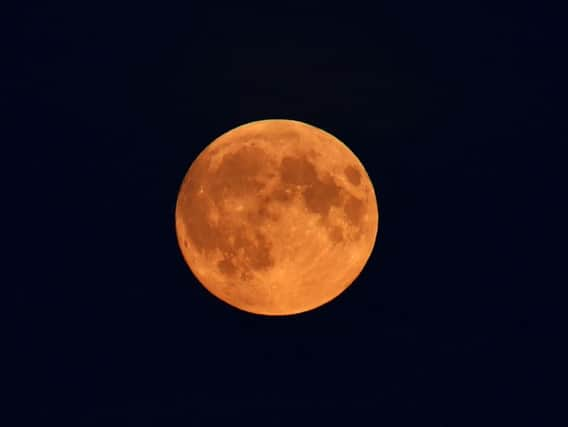This is when you can see the spectacular total lunar eclipse known as the Super Blood Wolf Moon


Astronomers and skygazers are particularly interested in this year's Super Blood Wolf Moon, as it is the last of its kind for two years.
A total lunar eclipse occurs when the Earth passes exactly between the sun and the moon, creating a shadow which stops solar rays reaching the lunar surface.
Advertisement
Hide AdAdvertisement
Hide AdSpectators can expect the moon to begin to darken slowly before turning red as it becomes completely caught in Earth’s shade.
A full moon in January is also known as a ‘wolf moon’, as Native American tribes said wolves would howl outside villages during full moons at the beginning of the year.
And as the eclipse will occur when the moon is at its closest point to Earth, it will appear 14 per cent larger and 30 per cent brighter - making it a supermoon.
"We're going into this unusual lull in total lunar eclipses over the next couple of years," said Tom Kerss, an astronomer from the Royal Observatory Greenwich.
Advertisement
Hide AdAdvertisement
Hide Ad"So this is a really good one to catch, as it's going to be a long time before you catch another one like this.
"We will have other lunar eclipses, we just won't have anything quite as spectacular until May 2021."
Weather permitting, the total lunar eclipse should be visible from the UK for a reasonable amount of time.
The eclipse is set to begin at 2.36am on Monday, January 21, though observers are unlikely to see anything until much later in the morning.
Advertisement
Hide AdAdvertisement
Hide AdThe best time is around 5.12am to catch the maximum eclipse, when the moon will be completely submerged within the Earth's shadow.
"The moon will be red between about 4.40am and about 6.45am, so it's actually more than an hour that you have to observe this blood moon phenomenon where the moon is totally eclipsed," Mr Kerss said.
The Royal Museums Greenwich is hosting a Facebook Live event from 4am, where viewers can watch as events unfold.
A blood moon last occurred in July 2018, though clouds largely obscured the celestial phenomenon in the UK.
Tonight might be a good night to see the spectacular phenomenon, however, as a clear night is forecast for the North East.